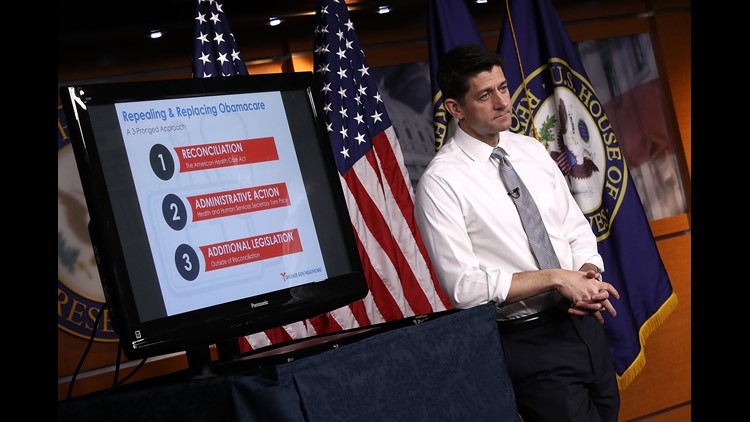WASHINGTON — A Republican bill to replace Obamacare would lead to 14 million fewer Americans with health insurance by 2018 and 24 million by 2026, the non-partisan Congressional Budget Office said Monday in an analysis that could make the controversial legislation even tougher for GOP leaders to push through Congress.
Most of the initial increase in uninsured people in 2018 would come from consumers deciding not to buy insurance because they would no longer have to pay a penalty for failing to do so, the CBO said. However, others would stop buying insurance because premiums will go up over the next two years, the analysis said.
The bill is expected to raise the average premiums that Americans would have to pay before 2020, and then lower them after that, the CBO projected. In 2018 and 2019, the average premiums for single policyholders who do not get insurance from their employers would be 15% to 20% higher than under Obamacare, the analysis said.
Starting in 2020, those premiums would begin to go down. By 2026, average premiums would be roughly 10% lower than under the existing Affordable Care Act, the CBO projected.
The number of uninsured Americans would rise dramatically during that same period as states phase out Obamacare's Medicaid expansion, the CBO said.
"In 2026, an estimated 52 million people would be uninsured, compared with 28 million who would lack insurance that year under current law," the analysis said.
The Republican bill would reduce federal deficits by $337 billion over the 2017-2026 period, according to the CBO. The biggest savings would come from reductions in outlays for Medicaid and from the elimination of the Affordable Care Act’s subsidies for low-income Americans to purchase insurance.
The CBO report came as Republican leaders in Congress were already scrambling to keep their fractious caucus together on the bill. Some conservatives have denounced the plan as "Obamacare lite," arguing that it does not go far enough in scrapping the Affordable Care Act and creates new entitlements by replacing the current law's federal subsidies for low-income people with tax credits. At the same time, some moderate Republicans in the Senate fear their low-income constituents will lose coverage because the legislation phases out the expansion of Medicaid that Obamacare helped fund in many states.
Democrats are fiercely opposed to the legislation, which they say will reduce coverage and end up costing patients more money. They also argue that the tax cuts in the bill will benefit the wealthy at the expense of middle-class and working-class families. And they say the CBO score underscores that President Trump was wrong when he promised "insurance for everybody" under the GOP plan.
House Speaker Paul Ryan, R-Wis., is leading the push for the bill, saying it is the best hope that Republicans have of ending Obamacare and passing a replacement bill under a fast-track budget procedure that cannot be blocked by Senate Democrats.
Ryan and other GOP congressional leaders were already trying to soften the blow of the CBO analysis even before it came out.
"The one thing I'm certain will happen is CBO will say, 'Well, gosh, not as many people will get coverage.' " Ryan said Sunday on CBS's Face the Nation. "You know why? Because this isn't a government mandate...We're not going to make an American do what they don't want to do. You get it if you want it."
The Congressional Budget Office, which was created by Congress in 1974, is a non-partisan group of economists and analysts that produces hundreds of cost estimates for Congress on proposed legislation each year. The office has a reputation for being impartial and its cost estimates — or "scores" — of bills are taken seriously by lawmakers as they decide whether to support legislation.
Republican leaders unveiled the American Health Care Act last week, and it has already been approved by the House Ways and Means Committee and the House Energy and Commerce Committee. It is scheduled to be taken up by the House Budget Committee on Wednesday, unless an expected snowstorm forces the Capitol to close. The bill will then go to the House Rules Committee, followed by a vote on the House floor as soon as next week. If the House passes the bill, it will be sent to the Senate for approval.
The GOP bill would no longer require Americans to buy health insurance. It also would replace direct federal subsidies with tax credits to help low-income people buy insurance, phase out the expansion of Medicaid, and allow insurance companies to charge older Americans more for their coverage. It increases the amount of money people can contribute to Health Savings Accounts, which are tax-exempt accounts that can be used to pay medical expenses.



